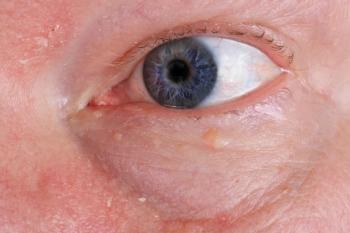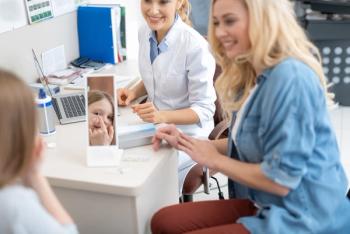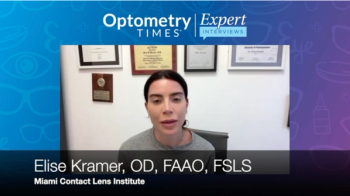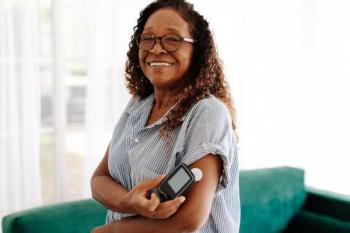
Q&A: Cheryl Donnelly, CEO, British Contact Lens Association
Cheryl Donnelly, CEO of the British Contact Lens Association, talks about learning from U.S. ODs, focusing on contact lenses, and shivering in Red Square in the latest Optometry Times Q&A.
Where did you grow up?
I grew up 25 miles north of Birmingham in the middle of the U.K. My father was European marketing manager for Rover. Mum was a biologist originally before she had me, then a series of part time jobs and bring up the kids. No mean feat as there are three of us.
What got you into opticianry?
It goes back to getting my grades to go into university. I was working as a Saturday girl in Boots the chemist in the stationery department selling scientific calculators, fountains pens, and home computers. I didn’t get the grades I was supposed to get, and the HR lady said, “I’ve got the thing for you. We’re opening an optician shop. When you retake your exams, how about you work as a receptionist for us?” It was the second Boots Opticians to open, so that was my introduction to optometry. I thought, “I could do that.” I went off and trained as a dispensing optician and wanted to do contact lenses. I carried on my education and qualified as a contact lens optician.
Why stick with opticianry, and why contact lenses?
I was lucky to be teaching the undergrads dispensing at Aston University because I was living not far away. All the time, I kept thinking, “Should I be an optometrist?” But I’d also got a fabulous day job. I was working for a very large chain, Dollond & Aitchison, as contact lens product manager and training manager for optometrists and pre-regs. I had a great time because I was able to do so many things and also teach at the university. I felt I was in a fabulous position doing all this other stuff, and if I did optometry I may end up being only in a consulting room. And whilst that has its great advantages, I felt I was able to give a lot more back by doing what I was doing. So it was quite a tough decision.
Previous Q&A:
How did you get from clinical care to association director?
I learned a lot at Dollond & Aitchison. But I felt that someone had approached me and said, “It might be time for you to work in industry.” I moved to Alcon professional affairs in the U.K., and the BCLA was introduced to me around that time. The BCLA was central to my working world. I then became president of the association in 2000. And it was still there in all my 13 years at Bausch + Lomb. Then the timing was right-my time at Bausch + Lomb came to an end and there was a vacancy at BCLA for somebody to take up the helm. All of us hold the association quite dear, and it’s central to what we do every day whether you’re working in it or alongside it.
What’s something your colleagues don’t know about you?
I used to play the trumpet, but my lip is not there anymore. My favorite thing to do is body-board. I love it. We go down to Cornwall and north Devon in the U.K. every summer. It’s the only thing that I do that I just forget everything.
What are the main differences between U.S. and U.K. optometry?
For example, a U.S. optometrist automatically has a therapeutic license. Here in the U.K., independent prescribing (IP), which is probably the equivalent of that therapeutic license, is something you would have to study to do. I think it’s fabulous that in the U.S. you have the doctor’s office right next to the retail glasses shop. They’re able to welcome a patient into their consulting room and charge for their time. It is so frustrating here in the U.K. that we’re not able to do that. Only a certain percentage of practitioners in the U.K. use that fee-based model. In other words, charge for the time and the expertise you’re giving your patients everyday. The U.K. consumer or patient mindset is quite different, and they don’t view eye care as something they should be paying a professional reasonable fee for, that’s the key difference. Clinically, I think U.S. and U.K. optometrists are on a par depending what level of education they’ve achieved. The drivers are your insurance system vs. our hereditary National Health Service (NHS) and the fact that you’re able to keep that professional charge element going.
Is retail optical a challenge to private practice ODs?
Everybody’s a private practice, I suppose. We have large multiples for a high percentage of contact lens prescribing. We have independent practice and a multiple driven practice, and they are quite different. But at the end of the day, everybody is a qualified clinician. They’re giving the same care to their patients. Sadly, we should be working together to educate the patient on what’s important and what level of patient you should be receiving and f those added things like technology and dry eye disease management. We should be working together to educate the public rather than fighting amongst ourselves whether we’re a multiple or an independent.
What do U.K. ODs want U.S. ODs to know?
I think U.K. optometrists would want to American optoms to appreciate that they are just as well qualified, particularly if they take up the IP qualification. I think they see the American ODs as having that extra level. When you look at what’s happening from a technology perspective, is the future of optometry going to be more about diagnosis from instrumentation but more importantly then, managing the patients from those diagnostic results. We’re going to have to change, and we’re going to have to meet and embrace the technology changes to make sure that the patient gets a consistent level of care. We need to engage in the patient and explain what extra tests are for or what this element of technology can do because we don’t have therapeutics as a mainstay within their qualification. We would like to understand how U.S. ODs are able to integrate that into practice because that’s something we’re starting to do with dry eye disease management, shared care for glaucoma, and diabetic retinopathy. That sharing of the knowledge and how they get their practices to work would be useful.
Why should U.S. ODs join BCLA?
Our mission is all about education. We began 40 years ago in somebody’s bedroom-that sounds good, doesn’t it? We now have about 40 percent international members, so we are quite an international organization. The challenge is that we’re British. Yes, we’re based here and we began here, but we have an international reach. We held a meeting in Hong Kong in 2016, we run the research track at the Netherland Contact Lens Congress, and we welcome 50 percent of our BCLA clinical conference attendees from overseas. We are the only association that will focus on contact lenses and anterior eye. Because we are the only people who are focused just on that element, there must be something we can do to educate people to share the latest research from our journal as well as our clinical conference. We welcome many Americans to our meeting and in fact, a lot of them are globally renowned. We always welcome them to join in and share their experience. Because [the U.S. has] vast patient numbers, vast country, and a vast wealth of experience to share, we can learn from you.
Related: Q&A:
What’s your guilty pleasure food?
I have lots. That’s terrible, isn’t it? I think it has to be cheese, particularly melted Camembert with a drizzle of oil and a little bit of rosemary baked in the oven with a fresh bit of baguette.
Do you have any regrets?
If I was my 16-year-old self, I would have studied harder, although I thought I was studying hard at the time. I would have loved to have done medicine. That’s my biggest regret, not studying to be an ophthalmologist. I feel that I could have made such a massive difference. What we do is good-we change people’s lives by encouraging practitioners to consider contact lenses as a form of vision correction as well as their specs. I think I could have done one stage further if I’d done ophthalmology, but I’m too old. And I probably wasn’t bright enough. [Laughs]
What’s the craziest thing you’ve ever done?
Standing in the middle of Red Square in the snow with no coat because I didn’t take one with me was probably the most ridiculous things I’ve ever done. That was December. I even bought one of those pull-down hats to wear. I left the hat on the airplane and left the coat in the taxi. Oh, and then a mad thing - I remember being in a souk with a big python around my neck. That was pretty horrible. It was part of a clinical meeting, and we all went on a day trip. We had to eat some awful delicacies, and then they thought it would be a good idea to put a snake round your neck and take a picture. Didn’t enjoy that. [Laughs]
Newsletter
Want more insights like this? Subscribe to Optometry Times and get clinical pearls and practice tips delivered straight to your inbox.













































